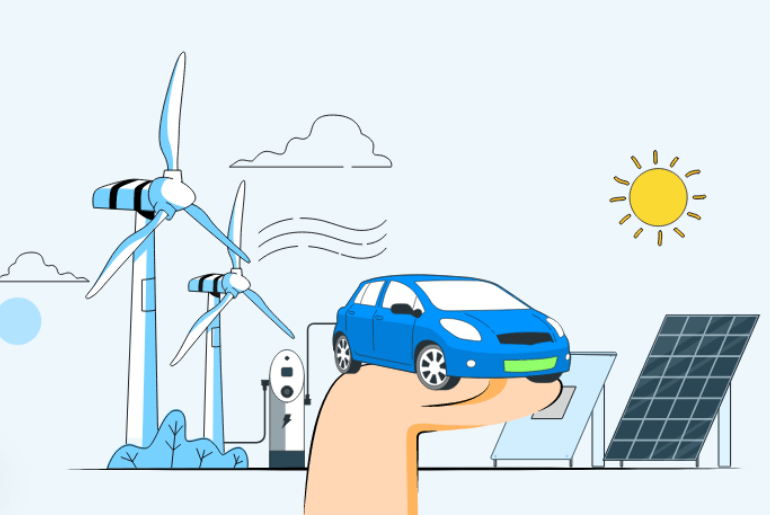The global transportation sector is undergoing a significant transformation driven by the dual imperatives of reducing carbon emissions and embracing sustainable energy solutions. At the heart of this transformation is the integration of renewable energy with Electric Vehicle (EV) charging infrastructure. This integration promises to enhance the sustainability of EVs, reduce reliance on fossil fuels, and contribute to a cleaner, greener future. This article explores the various dimensions of integrating renewable energy with EV charging points, highlighting the benefits, challenges, and future prospects of this energy.
The Convergence of EVs and Renewable Energy
Electric Vehicles are inherently more environmentally friendly than their Internal Combustion Engine (ICE) counterparts, primarily due to their zero tailpipe emissions. However, the true environmental benefit of EVs can only be realized if the electricity used to charge them is sourced from renewable energy. Integrating solar, wind, and other renewable energy sources with EV charging points creates a sustainable loop that significantly reduces the carbon footprint of transportation.
Benefits of Integrating Renewable Energy with EV Charging
- Reduction in Greenhouse Gas Emissions: By powering EVs with renewable energy, we can drastically reduce greenhouse gas emissions. This integration helps mitigate the impacts of climate change by cutting down the emissions associated with electricity generation from fossil fuels.
- Enhanced Grid Stability: Renewable energy sources like solar and wind can be unpredictable. Integrating EV charging infrastructure with renewable energy can provide a flexible demand response solution. EVs can be charged during periods of excess renewable generation, helping to stabilize the grid and reduce the need for fossil fuel-based peaking power plants.
- Economic Benefits: Utilizing renewable energy for EV charging can lead to significant cost savings over time. The cost of renewable energy has been steadily decreasing, and as technology advances, it will become even more affordable. These savings can be passed on to consumers, making EV ownership more attractive.
- Energy Independence: Countries that rely heavily on imported fossil fuels can enhance their energy security by producing electricity locally from renewable sources. This shift reduces dependency on foreign energy supplies and enhances national security.
- Promotion of Sustainable Technologies: Integrating renewable energy with EV charging infrastructure promotes the adoption of other sustainable technologies, such as smart grids and energy storage systems, which are crucial for a sustainable energy future.
Technological and Infrastructure Challenges
Despite the clear benefits, integrating renewable energy with EV charging points presents several challenges:
- Intermittency of Renewable Energy: Solar and wind power are intermittent sources of energy, meaning they do not produce electricity consistently. This intermittency can lead to periods where renewable energy is insufficient to meet EV charging demands. Addressing this challenge requires advanced energy storage solutions and smart grid technologies to ensure a reliable power supply.
- Infrastructure Development: Building the infrastructure necessary for widespread integration of renewable energy and EV charging is a significant task. This includes not only the charging stations themselves but also the necessary upgrades to the electrical grid to handle increased loads and the installation of renewable energy generation systems.
- Cost of Implementation: While the long-term economic benefits are clear, the initial cost of integrating renewable energy with EV charging infrastructure can be high. Investments in solar panels, wind turbines, energy storage systems, and grid upgrades are substantial, and funding these projects can be a barrier.
- Regulatory and Policy Hurdles: Effective integration requires supportive policies and regulatory frameworks. Governments need to create conducive environments for investment in renewable energy and EV infrastructure, including incentives, subsidies, and streamlined permitting processes.
Future Prospects and Innovations
Despite these challenges, the future of integrating renewable energy with EV charging points is promising. Several innovations and trends are driving this integration forward:
- Advanced Energy Storage Solutions: Battery technology is advancing rapidly, with new materials and designs promising greater storage capacity and efficiency. These advancements will help address the intermittency of renewable energy by storing excess power for use during periods of low generation.
- Vehicle-to-Grid (V2G) Technology: V2G technology allows EVs to feed electricity back into the grid when they are not in use. This capability transforms EVs into mobile energy storage units, providing additional flexibility and stability to the grid.
- Smart Grids: The development of smart grid technology enables more efficient and responsive management of electricity supply and demand. Smart grids can optimize the integration of renewable energy with EV charging, ensuring that power is available when and where it is needed most.
- Distributed Energy Resources (DERs): Small-scale renewable energy generation systems, such as rooftop solar panels, can be integrated into the grid to support EV charging infrastructure. These distributed energy resources reduce the need for large, centralized power plants and enhance grid resilience.
- Government Initiatives and Corporate Commitments: Governments around the world are recognizing the importance of integrating renewable energy with EV infrastructure and are introducing policies to support this goal. Additionally, many corporations are committing to sustainability targets that include the use of renewable energy for EV fleets.
Conclusion
The integration of renewable energy with EV charging points represents a critical step towards a sustainable transportation future. By addressing the challenges and leveraging technological advancements, we can create a robust infrastructure that supports the widespread adoption of EVs while minimizing environmental impact. This synergy between renewable energy and electric vehicles is not just an opportunity; it is an imperative for a cleaner, greener planet. As we move forward, continued innovation, supportive policies, and collaborative efforts will be essential to realizing the full potential of this transformative integration.

